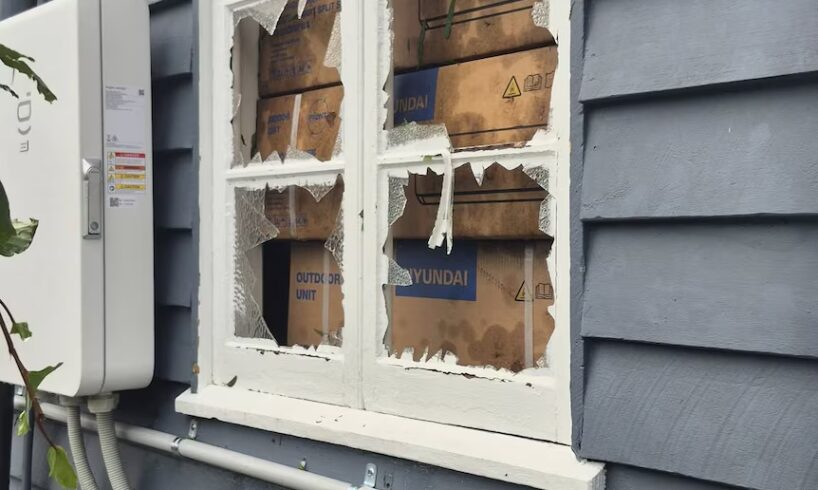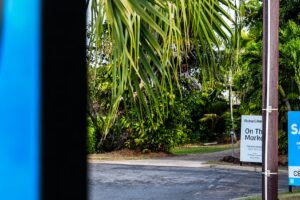
Giant hail has smashed cars and homes across south-east Queensland, prompting a warning for residents to be aware of “disaster chasers” as the clean-up begins.
According to the Insurance Council of Australia (ICA), more than 19,300 insurance claims have been made following the severe thunderstorm that hit Brisbane and its surrounds on Sunday, October 26.
Another 3,880 claims have been made following consecutive storms from October 31 to November 2, which brought hail of up to 8 centimetres to some areas.
The ICA is urging residents to be on alert for opportunistic individuals who offer quick-fix clean-up, repairs, and inspections, and often demand up-front cash payments for shoddy or incomplete work.
Large hail damaged cars in Esk. (Supplied: Jon Betts)
ICA’s mitigation and extreme weather response director Liam Walter said some “disaster chasers” pressure home owners to sign a contract on the spot for future repair work and may promise their insurer will pay.
Mr Walter said it could leave the home owner liable to pay a commission or inflated repair bills not covered by their insurance policy, as insurers will only pay for approved work that is covered by a policy.
“They can leave families, the elderly and vulnerable Australians much worse off, with large bills and homes that remain damaged,” he said.
Lightning at Boondall on Brisbane’s northside during the severe storm on October 26. (ABC News: Emma Pollard)
How ‘disaster chasers’ can work
Julie Maron is a senior lawyer with Legal Aid Queensland’s disaster help service and has been assisting people on the ground in north Queensland following this year’s floods.
She said people had unwittingly signed contracts after being approached by someone offering to help manage their insurance claims, and it had “gone horribly wrong”.
“They’ll knock on the doors of all the houses up and down the street and talk people into signing a contract,” Ms Maron said.
She said companies also used social media to advertise their services and put up posters in suburbs that had been impacted.
Motorists were forced to pull over near East Greenmount in the Toowoomba region due to poor visibility on Saturday afternoon. (Supplied: Trent Frecklington)
Ms Maron said she had been told people had signed on a digital device at their door, but were not given a written copy of the contract.
“There’s no explanation of the fee structure or what will actually happen and then they end up with these big termination fees,” she said.
Ms Maron said she had seen cases where a company had offered to manage someone’s insurance claim and the same, or a related company, had been engaged to do the repairs.
She said the companies told clients they needed to get a cash settlement from their insurer to pay the builders.
“They’re charging people huge amounts of money, out of a limited sum of money that you’re getting for your insurance claim, to do things that can and should be done for free,” Ms Maron said.
Giant hail, lightning and rain hit south-east Queensland
What are the signs to look out for?
Queensland Building and Construction Commission (QBCC) chief executive and commissioner Angelo Lambrinos said home owners should be asking contractors who turn up for their licence.
“If they can’t show them the licence, then show them the door,” he said.
He said people could also search the QBCC licence register to see whether the contractor had a clear record, their qualifications and whether any disciplinary action had been taken against them.
The Office of Fair Trading also advises people who are approached by travelling traders to check their company or business name with the Australian Securities and Investment Commission (ASIC) and ensure they have an Australian Business Number (ABN).
Mr Lambrinos said it was important to ensure the signed contract articulated the scope of work that needed to be completed and all parties were clear on their rights and obligations under the contract.
Hailstones of up to 8 centimetres fell at Googa Creek, north of Toowoomba. (Supplied: Khia Chagas)
The ICA said an insurer would not send a tradesperson or builder to a home without notifying the owner and providing details.
It advises people to speak to their insurer before agreeing to any repairs or rebuilding work to make sure they will cover the work.
Mr Walter, from the ICA, said anyone who sustained damage and was yet to make a claim should contact their insurer, even if the extent of the damage was not yet known.
What to do if you fall victim
Customers have extra rights if a salesperson or trader has come to their home unannounced.
The Office of Fair Trading states that if the contract is worth more than $100, the home owner is entitled to a 10-day cooling-off period.
During this time, the salesperson cannot take money, including a deposit, start work, or provide goods or services, and the contract can be cancelled in writing at any time.
The ICA says it advises people who have any doubts to contact their insurer.





